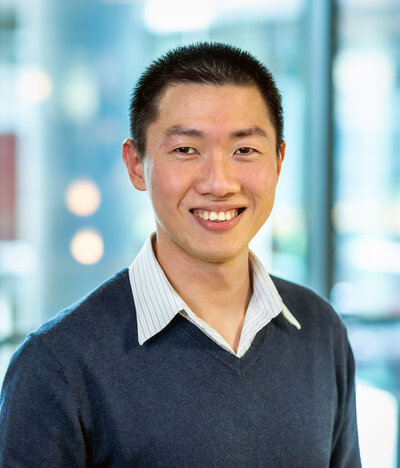Nicholas Kurniawan
Department / Institute

RESEARCH PROFILE
Nicholas Kurniawan is an Associate Professor in the Soft Tissue Engineering and Mechanobiology group. His research focuses on understanding why and how cells behave the way they do in different physical environments. To answer this question, he creates biomimetic cellular environments at multiple scales—from 2D micropatterns to 3D extracellular matrices and bioreactors—where every physical and mechanical cues to the cells can be precisely controlled. These in vitro platforms enable him to systematically break down the origins of basic cellular behavior, such as orientation, migration, and differentiation. The overarching goal is to use the obtained insights to direct cell response in vivo, for example to promote tissue regeneration or to slow down disease progression. Nicholas’s research is highly interdisciplinary, encompassing biophysics, cell biology, protein polymers, biomechanics, and soft matter.
The cell is a physical entity that interacts with its surrounding objects. By smartly designing the cellular environment, we essentially can have a remote control for steering cell behavior.
ACADEMIC BACKGROUND
Nicholas Kurniawan received his PhD in 2012 from the National University of Singapore (Singapore), studying the role of matrix viscoelasticity in cancer metastasis. He then carried out postdoctoral research as a Marie Curie Fellow at AMOLF (Amsterdam, the Netherlands), investigating the hierarchical structure-property relation in the cytoskeleton and extracellular matrices. In 2015, he joined Eindhoven University of Technology (TU/e) in Eindhoven, the Netherlands, in the research group Soft Tissue Engineering and Mechanobiology (department of Biomedical Engineering). He is also a member of the Institute for Complex Molecular Systems (ICMS).
Recent Publications
-
Maaike Bril,Aref Saberi,Ignasi Jorba,Mark C. van Turnhout,Cecilia M. Sahlgren,Carlijn V.C. Bouten,Albert P.H.J. Schenning,Nicholas A. Kurniawan
Shape-Morphing Photoresponsive Hydrogels Reveal Dynamic Topographical Conditioning of Fibroblasts
Advanced Science (2023) -
Dylan Mostert,Janine Grolleman,Mark C. van Turnhout,Vito Conte,Cecilia M. Sahlgren,Nicholas A. Kurniawan,Carlijn V.C. Bouten
SFAlab
Frontiers in Cell and Developmental Biology (2023) -
Dylan Mostert,Ignasi Jorba,Robert Passier,Marie José T.H. Goumans,Huibert A. van Boxtel,Nicholas A. Kurniawan,Carlijn V.C. Bouten,Leda Klouda
Methacrylated human recombinant collagen peptide as a hydrogel for manipulating and monitoring stiffness-related cardiac cell behavior
iScience (2023) -
Barbara Schamberger,Ricardo Ziege,Karine Anselme,Martine Ben Amar,Michał Bykowski,André P.G. Castro,Amaia Cipitria,Rhoslyn A. Coles,Rumiana Dimova,Michaela Eder
Curvature in Biological Systems
Advanced Materials (2023) -
Dylan Mostert,Leda Klouda,Robert Passier,Marie-Jose Goumans,Nicholas A. Kurniawan,Carlijn V.C. Bouten
Human pluripotent stem cell-derived cardiomyocytes align under cyclic strain when guided by cardiac fibroblasts
APL Bioengineering (2022)
Ancillary Activities
- Associate Editor, Frontiers in Cell and Developmental Biology